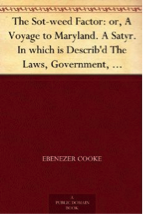 Ebenezer Cooke, sometimes spelled Cook, was an American satirical poet and lawyer, born in London sometime during the second half of the 17th century. He is generally acknowledged by literary scholars to be the first American poet to write a satirical piece –
Ebenezer Cooke, sometimes spelled Cook, was an American satirical poet and lawyer, born in London sometime during the second half of the 17th century. He is generally acknowledged by literary scholars to be the first American poet to write a satirical piece –

which was written in 1708.
Precise details of his early life are unknown but it is estimated that he was born, probably in London, some time during the year 1665. He was presumably taken to America shortly afterwards where his father built up a considerable estate at Malden, in Maryland. A good education allowed him to train to become a lawyer and he was admitted to the bar of Prince George”s County, Maryland. He practiced for a time but, in 1694, set sail for England and lived in London once more. On the death of his father though Cooke returned to Maryland and inherited half of the estate.
It is fortunate that a historian by the name of Lawrence C Wroth wrote pieces in The Maryland Muse sometime during the year 1730 which contained details about the Cooke family going back to the original settlers of 1661 and this information survived and was re-published in 1934. The account shows that Ebenezer’s father married in England, in 1664, and the boy was probably born the following year. It is suggested in The Sot–Weed Factor that Cooke attended Cambridge University, though precisely when this happened is unclear. This poem was published in London, in 1708, and a few years later he went to Maryland.
The above-mentioned, highly satirical poem was based on a series of misadventures that befell the author. At first glance it appears to be a sometimes cruel attack on the early American settlers and especially on the pamphleteers who suggested that would-be migrants would find an easy and lucrative life in the new world. The protagonist in the piece is a tobacco merchant, hence the name “sot-weed”, who is swindled out of a good deal of his money by a corrupt lawyer. This character is referred to as an “ambodexter quack”. The rudeness, and even brutishness, of the colonists and Native Americans is a shock to him and he soon leaves, chastened and disheartened.
Naturally the piece has been examined forensically by critics during recent centuries and some detect an element of “dual satirisation”, meaning both new and existing colonists receive equal treatment. It is often argued though that this poem actually helped to create a new national identity, enabling new immigrants to adapt to their new life and circumstances quickly. Future writers such as Benjamin Franklin and Alexander Hamilton copied, at least in some ways, this kind of “self-referential satire”. Indeed, Cooke parodies himself in the poem, showing the “speaker” to be a “complete ass”.
Here are the opening lines to this extremely long poem. They set the scene for the horrors and hardships that lay ahead for these travellers, describing the ship as being

Other pieces of work by this writer tend to focus on elegies for departed notaries. Good examples were

As mentioned above, details of both his birth and death are sketchy at best but it is believed that Ebenezer Cooke died sometime during the year 1732. If this is true he would have been 67 years old.

